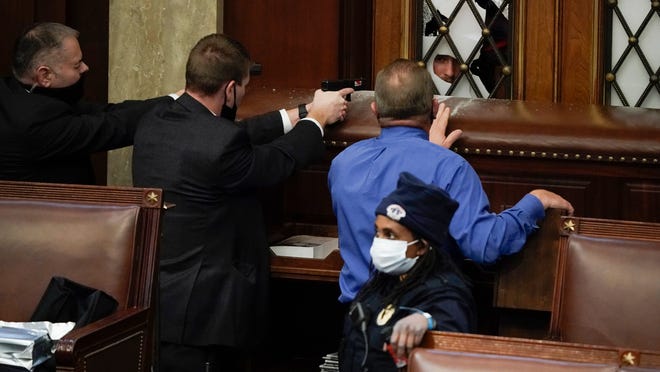'History repeating itself': Immigrants know what political violence looks like. Capitol riot has many shaken.
WASHINGTON – Vesna Jaksic Lowe expressed frustration that her American-born friends were surprised when rioters supporting President Donald Trump stormed the Capitol after "four years of nothing but warning signs."
When she was 13, her parents saw the signs of growing political tension and decided to leave Yugoslavia just months before civil war broke out.
This moment is a good opportunity for Americans to learn from immigrants and refugees, said Jaksic Lowe, a nonprofit communications consultant who also runs a newsletter on writing by immigrants.
"As immigrants, we know that fascism and nationalism and racism and the culmination of violence that it often leads to can happen everywhere," said Jaksic Lowe, who now lives in Connecticut. "I don't think we have this American exceptionalism that blinds us from seeing that.
"It’s sad to see history repeating itself all over again."
'We feared for our safety':After Capitol riots, Black, Latino Americans worry about more violence in DC
After months of Trump refusing to accept the results of the 2020 election, thousands of rioters overwhelmed police and breached the Capitol in an unprecedented assault on the Democratic process Wednesday, resulting in at least five deaths and more than 60 arrests, according to police.
Many immigrants and their children expressed disbelief online Thursday that the political violence they or their parents fled in other parts of the world had come to America's capital.
Wisam Asal, 53, said he moved to Bowling Green, Kentucky, from Iraq as a refugee in 2010 because his city was unsafe and some of his friends had been killed and kidnapped. Asal, co-owner of the Jasmine International Store, said the chaos was "unbelievable."
"We usually see these things happen like in other countries," he said. "I think it was no safer what happened here or in my country."
Felix Stetsenko said he felt a "deep pit" in his stomach as he watched a livestream of rioters storming the building from his home in the Adams Morgan neighborhood in Washington. Stetsenko, a consultant who works in the transportation industry, said he has seen violence like that in Ukraine, from where his parents emigrated from, but never thought it could happen here.
"I had more faith in this country than what I saw yesterday," he said while out for an early morning run in Black Lives Matter Plaza on Thursday. "I’m not sure whether to be hopeful about whether we’ll come back from this or if things will only get worse from here."
Like Stetsenko, many Western democracies assumed their political systems could not be subject to challenges from the streets, said Mark Almond, an Oxford University historian.
He noted that former President George W. Bush compared the "mayhem" at the Capitol to "how election results are disputed in a banana republic — not our democratic republic."
Banana republic is a term for a politically unstable country that depends on the exportation of a limited resource like bananas or minerals. The comparison is both disparaging to other countries and inaccurate, said Almond, who has been an election observer for more than 100 elections in Europe and Asia.
Successful coups are typically much more organized and require control of the media, communication channels and a large armed force as opposed to Wednesday's "very amateurish, chaotic event," he said.
"Had you had a more sinister person determined to stay in power organizing the crowd, bringing together well-trained and disciplined forces, then the threat would’ve been vastly greater," he said.
Wednesday's riot showed that even the United States is vulnerable, at least in the short term, Almond said.
But while some immigrants may fear that what happened in their country of origin could be on the horizon, it's unlikely the United States government could be overthrown because the country is so large and has multiple centers of institutional power beyond the capital.
"Although people are shocked by this event and they’re right to be shocked, the United States is in many ways immune to a coup d’etat because of its scale and diversity," he said.
'This is our house, and we're gonna protect it':Lawmakers prepared to fight or be killed as Trump mob attacked US Capitol
Still, many first- and second-generation immigrants said the chaos that unfolded in the Capitol bore eerie similarities to political tension that led to conflict in their home countries.

Marissa Parra, a reporter for CBS 2 Chicago, said she grew up hearing stories from her father and grandparents about the political instability in Bolivia, particularly around elections.
She said that when she saw the violence unfolding in Washington, she couldn't help but wonder if it was "a slippery slope."
"I had this kind of surreal moment where I heard my grandfather’s words about what happens during elections in Bolivia," she said. "It felt like I was watching that unfold in Bolivia in real time."
N'dea Yancey-Bragg reported from Washington, D.C. Follow her on Twitter: @NdeaYanceyBragg. Michelle Hanks reported from Bowling Green, Kentucky.
